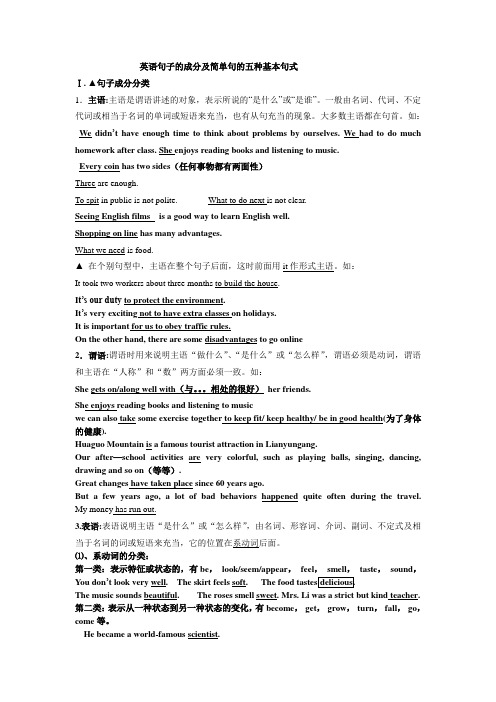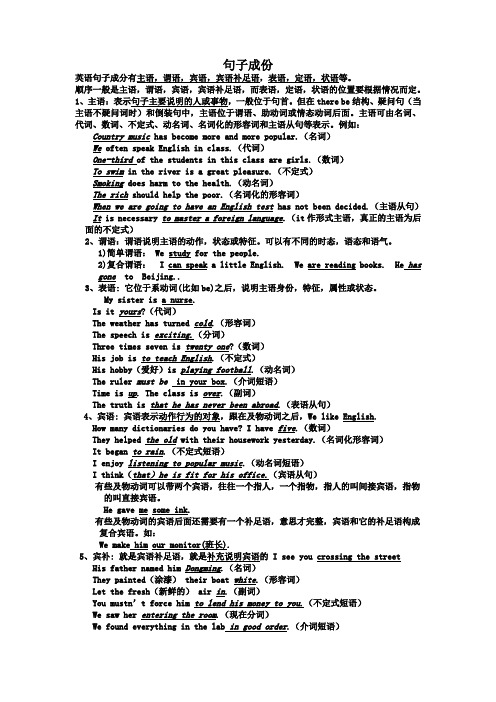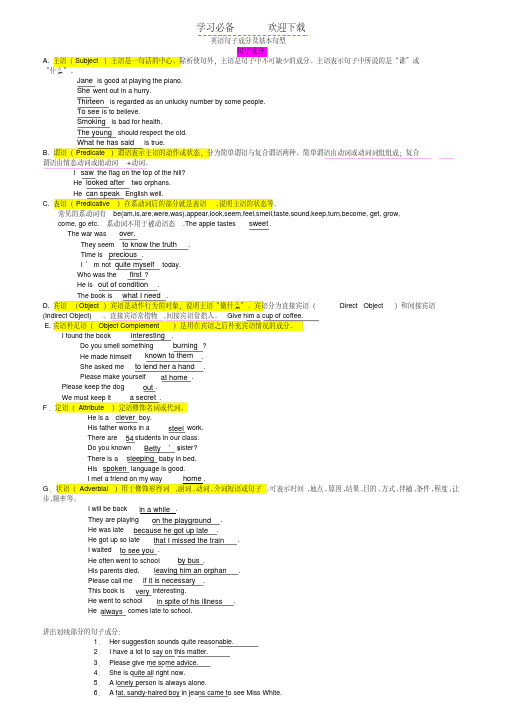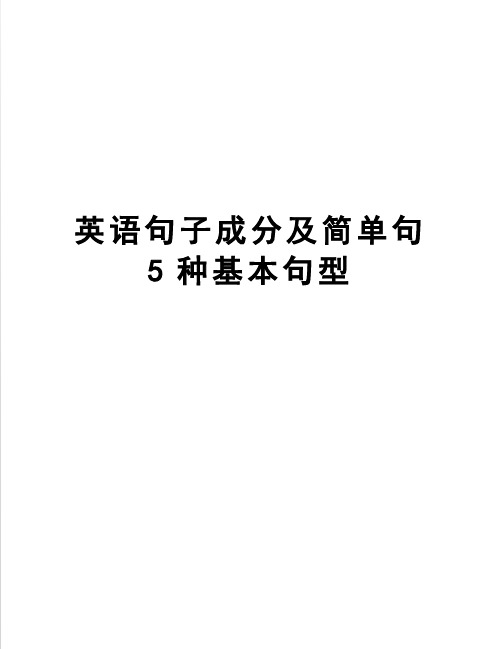英语句子成分及基本句型
英语句子的成分及简单句的五种基本句式

英语句子的成分及简单句的五种基本句式Ⅰ. ▲句子成分分类1.主语:主语是谓语讲述的对象,表示所说的“是什么”或“是谁”。
一般由名词、代词、不定代词或相当于名词的单词或短语来充当,也有从句充当的现象。
大多数主语都在句首。
如:We didn’t have enough time to think about problems by ourselves. We had to do muchhomework after class. She enjoys reading books and listening to music.Every coin has two sides(任何事物都有两面性)Three are enough.To spit in public is not polite. What to do next is not clear.Seeing English films is a good way to learn English well.Shopping on line has many advantages.What we need is food.▲在个别句型中,主语在整个句子后面,这时前面用it作形式主语。
如:It took two workers about three months to build the house.I t’s our duty to protect the environment.It’s very exciting not to have extra classes on holidays.It is important for us to obey traffic rules.On the other hand, there are some disadvantages to go online2.谓语:谓语时用来说明主语“做什么”、“是什么”或“怎么样”,谓语必须是动词,谓语和主语在“人称”和“数”两方面必须一致。
英语句子成分和五种基本句型

句子成份英语句子成分有主语,谓语,宾语,宾语补足语,表语,定语,状语等。
顺序一般是主语,谓语,宾语,宾语补足语,而表语,定语,状语的位置要根据情况而定。
1、主语:表示句子主要说明的人或事物,一般位于句首。
但在there be结构、疑问句(当主语不疑问词时)和倒装句中,主语位于谓语、助动词或情态动词后面。
主语可由名词、代词、数词、不定式、动名词、名词化的形容词和主语从句等表示。
例如:Country music has become more and more popular.(名词)We often speak English in class.(代词)One-third of the students in this class are girls.(数词)To swim in the river is a great pleasure.(不定式)Smoking does harm to the health.(动名词)The rich should help the poor.(名词化的形容词)When we are going to have an English test has not been decided.(主语从句)It is necessary to master a foreign language.(it作形式主语,真正的主语为后面的不定式)2、谓语:谓语说明主语的动作,状态或特征。
可以有不同的时态,语态和语气。
1)简单谓语: We study for the people.2)复合谓语: I can speak a little English. We are reading books. He hasgone to Beijing..3、表语: 它位于系动词(比如be)之后,说明主语身份,特征,属性或状态。
My sister is a nurse.Is it yours?(代词)The weather has turned cold.(形容词)The speech is exciting.(分词)Three times seven is twenty one?(数词)His job is to teach English.(不定式)His hobby(爱好)is playing football.(动名词)The ruler must be in your box.(介词短语)Time is up. The class is over.(副词)The truth is that he has never been abroad.(表语从句)4、宾语: 宾语表示动作行为的对象,跟在及物动词之后,We like English.How many dictionaries do you have? I have five.(数词)They helped the old with their housework yesterday.(名词化形容词)It began to rain.(不定式短语)I enjoy listening to popular music.(动名词短语)I think(that)he is fit for his office.(宾语从句)有些及物动词可以带两个宾语,往往一个指人,一个指物,指人的叫间接宾语,指物的叫直接宾语。
英语句子成分及基本句型

英语句子成分及基本句型句子成分A. 主语(Subject)主语是一句话的中心。
除祈使句外,主语是句子中不可缺少的成分。
主语表示句子中所说的是“谁”或“什么”。
Jane is good at playing the piano.She went out in a hurry.Thirteen is regarded as an unlucky number by some people.To see is to believe.Smoking is bad for health.The young should respect the old.What he has said is true.B. 谓语(Predicate)谓语表示主语的动作或状态,分为简单谓语与复合谓语两种。
简单谓语由动词或动词词组组成;复合谓语由情态动词或助动词+动词。
I saw the flag on the top of the hill?He looked after two orphans.He can speak English well.C. 表语(Predicative)在系动词后的部分就是表语,说明主语的状态等。
常见的系动词有be(am,is,are,were,was),appear,look,seem,feel,smell,taste,sound,keep,turn,become, get, grow,come, go etc.系动词不用于被动语态.The apple tastes sweet.The war was over.They seem to know the truth.Time is precious.I’m not quite myself today.Who was the first?He is out of condition.The book is what I need.D. 宾语(Object)宾语是动作行为的对象,说明主语“做什么”。
英语句子成分和五种基本句型

以上两个句型可以互换: He gave me a pen.=He gave a pen to me. He will buy me some books.=he will buy some books for me. She made me a cake.=she made a cake for me. 4. “疑问词+不定式”作直宾 He taught me how to read the word. She asked me which way to go. I told him what to do. He asked me why to sing this song.
宾语补足语
在英语中,有些句子里只有宾语并不能表达
完整的意思,还必须在宾语后面加上宾语补 足语才能表达完整的意思。我们把“宾语+宾 语补足语”称为复合宾语。名词、形容词、 副词、介词短语、不定式、现在分词、过去 分词都可以做宾语补足语。通常位于宾语之 后。
If
you let me go, I will make you king. Leave the door open. We found Li Ming out when we arrived. Make yourself at home. The manager asked him to wait. I saw her enter the shopping mall. The boss kept him working all day. Yesterday he got his leg broken.
状语
状语用来修饰动词、形容词或副词。一般表示行
为发生的时间、地点、目的、方式、程度等意义, 常由副词、介词短语、不定式、句子或相当于副 词的词或短语来表示。一般放在句末,有时可以 放在句首、句中。 He did it carefully. Without his help, we couldn’t work it out. (In order) to catch up with my classmates, I must study hard. Just as I was leaving, the phone rang again.
英语句子成分及简单句5种基本句型

英语句子成分及简单句5种基本句型一、英语句子成分根据英语词汇在英语句子中的地位和作用, 英语句子的成分可分为主语、谓语、宾语、宾语补足语、表语、定语、状语、同位语及独立成分等。
其中,主语和谓语是句子的主要成分,一般情况下,一个句子不能缺少这两种成分。
现将不同句子成分的用法列举如下:1. 主语:表示句子所要说明或描述的人或事物,一般由名词、代词或相当于名词的词组或句子充当,置于句首。
如:It's getting cold. 天冷起来了。
Now everything is ready. 现在一切都准备好了。
The teacher is very kind to us. 老师对我们很好。
2. 谓语:说明或描述主语的动作、状态或特征,由动词或动词短语充当,位于主语之后。
如:Mother bought me a birthday present. 妈给我买了个生日礼物。
We have finished our work already. 我们已经完成了工作。
3. 表语:表示主语的身份、性质、状态和特征,一般由名词、形容词、或相当于名词、形容词的词、短语或句子充当,位于系动词之后,形成英语独有的主系表结构。
如:Be careful! 小心!All the students are lovely. 所有的学生都很可爱。
He looks very angry. 他看上去很生气。
4. 宾语:指动作所涉及的人或事物,一般由名词、代词或相当于名词的词组或句子充当,位于动词之后。
如:He wrote many plays. 他写了许多剧本。
She loves swimming. 她喜欢游泳。
5. 宾语补足语:用来对宾语进行补充和说明,一般由名词、形容词、副词、介词短语或非谓语动词充当。
如:He told us to stay. 他叫我们留下。
I've never seen her dancing. 我从未看见过她跳舞。
英语句子成分及简单句5种基本句型

英语句子成分及简单句5种基本句型英语句子成分及简单句5种基本句型一、英语句子成分根据英语词汇在英语句子中的地位和作用, 英语句子的成分可分为主语、谓语、宾语、宾语补足语、表语、定语、状语、同位语及独立成分等。
其中,主语和谓语是句子的主要成分,一般情况下,一个句子不能缺少这两种成分。
现将不同句子成分的用法列举如下:1. 主语:表示句子所要说明或描述的人或事物,一般由名词、代词或相当于名词的词组或句子充当,置于句首。
如:It's getting cold. 天冷起来了。
Now everything is ready. 现在一切都准备好了。
The teacher is very kind to us. 老师对我们很好。
2. 谓语:说明或描述主语的动作、状态或特征,由动词或动词短语充当,位于主语之后。
如:Mother bought me a birthday present. 妈给我买了个生日礼物。
We have finished our work already. 我们已经完成了工作。
3. 表语:表示主语的身份、性质、状态和特征,一般由名词、形容词、或相当于名词、形容词的词、短语或句子充当,位于系动词之后,形成英语独有的主系表结构。
如:Be careful! 小心!All the students are lovely. 所有的学生都很可爱。
He looks very angry. 他看上去很生气。
4. 宾语:指动作所涉及的人或事物,一般由名词、代词或相当于名词的词组或句子充当,位于动词之后。
如:He wrote many plays. 他写了许多剧本。
She loves swimming. 她喜欢游泳。
5. 宾语补足语:用来对宾语进行补充和说明,一般由名词、形容词、副词、介词短语或非谓语动词充当。
如:He told us to stay. 他叫我们留下。
I've never seen her dancing. 我从未看见过她跳舞。
英语句子成分及五种基本句型

1. This is an English-Chinese dictionary. 这是本英汉辞典。
2. The dinner smells good.
午餐的气味很好。
3. Everything looks different.
一切看来都不同了。
4. He is growing tall and strong. 他长得又高又壮
小结
谓语是句子的躯干,说明主语的动作. 谓语动词随着主语的不同而变化, 随着时间的不同而变化, 随 着与主语的不同关系( 主动关系和被动关系)而变化, 总之,时时 在变.
谓语有三种不同的形式:
1) 动词
They planted many trees on the hill .
2) 情态动词 + 动词 You must stay at home .
形容词
The teacher was satisfied with your work.
They are at home now.
介词短语
My job is to teach English.
不定式
Seeing is believing.
动名词
基本句型2: 主+系+表
此句型的句子有一个共同的特点: 句子谓语动词都不能表达一个完整的 意思,必须加上一个表明主语身份或状态的表语构成复合谓语,才能表 达完整的意思。这类动词叫做连系动词。
七种句子基本成分:
I saw a tall boy take your
主谓
ห้องสมุดไป่ตู้
定宾 补
book just now.
状
五种基本句型:
1 主+谓 2 主+系+表 3 主+谓+宾 4 主+谓+间宾+直宾 5 主+谓+宾+宾补
英语句子成分和五个基本句型

名 词.单词作定语时通常放在它所修 (五)定语 是修饰___ 前 饰的名词之_____ ;短语和从句作定语时则放在它所修饰 的名词之_____ 后 。
名词 They are woman workers. Tom's father didn't write home until yesterday. 名词所有格 形容词 adj Mary is a beautiful girl.. 数词 The play has three acts. 形容词 /序数词 /to do 不定式 This is her first trip to Europe. China is a developing country. 现在分词 doing I have nothing to eat. to do 不定式 Those who want to go to Tibet are to sign their names here. 从句
七)宾语补足语。英语有些及物动词,除了要有宾语之 外,还要加上宾语补足语,才能使句子的意义完整。
They elected me captain of the team. 名词 We try to make our country strong. 形容词 We found everything in good order there.介词短语 I should advise you to get the chance. to do 不定式 I saw him going upstairs. 现在分词 doing They found the house broken in. done 过去分词
3.主语 + 谓语 + 宾语
1)The boss employed five more workers. 主语 谓语 宾语 2)My brother takes care of the vegetable garden. 3)Few students like taking exams. 4)He forgot to close the door. 5)I hope I can speak English fluently.
- 1、下载文档前请自行甄别文档内容的完整性,平台不提供额外的编辑、内容补充、找答案等附加服务。
- 2、"仅部分预览"的文档,不可在线预览部分如存在完整性等问题,可反馈申请退款(可完整预览的文档不适用该条件!)。
- 3、如文档侵犯您的权益,请联系客服反馈,我们会尽快为您处理(人工客服工作时间:9:00-18:30)。
英语句子成分及基本句型
1.1 句子成分
A. 主语(Subject)主语是一句话的中心。
除祈使句外,主语是句子中不可缺少的成分。
主语表示句子中所说的是“谁”或“什么”。
Jane is good at playing the piano.
She went out in a hurry.
Thirteen is regarded as an unlucky number by some people.
To see is to believe.
Smoking is bad for health.
The young should respect the old.
What he has said is true.
B. 谓语(Predicate)谓语表示主语的动作或状态,分为简单谓语与复合谓语两种。
简单谓语由动词或动词词组组成;复合谓语由情态动词或助动词+动词。
I saw the flag on the top of the hill?
He looked after two orphans.
He can speak English well.
C.表语(Predicative)在系动词后的部分就是表语,说明主语的状态等。
常见的系动词有
be(am,is,are,were,was),appear,look,seem,feel,smell,taste,sound,keep,turn,become, get, grow, come, go etc.系动词不用于被动语态.The apple tastes sweet.
The war was over.
They seem to know the truth.
Time is precious.
I’m not quite myself today.
Who was the first?
He is out of condition.
The book is what I n eed.
D. 宾语(Object)宾语是动作行为的对象,说明主语“做什么”。
宾语分为直接宾语(Direct Object)和间接宾语(Indirect Object)。
直接宾语常指物,间接宾语常指人。
Give him a cup of coffee.
E.宾语补足语(Object Complement)是用在宾语之后补充宾语情况的成分。
I found the book interesting.
Do you smell something burning?
He made himself known to them.
She asked me to lend her a hand.
Please make yourself at home.
Please keep the dog out.
We must keep it a secret.
F.定语(Attribute)定语修饰名词或代词。
He is a clever boy.
His father works in a steel work.
There are 54students in our class.
Do you known Betty’s sister?
There is a sleeping baby in bed.
His spoken language is good.
I met a friend on my way home.
G.状语(Adverbial)用于修饰形容词,副词,动词,介词短语或句子.可表示时间,地点,原因,结果,目的,方式,伴随,条件,程度,让步,频率等。
I will be back in a while.
They are playing on the playground.
He was late because he got up late.
He got up so late that I missed the train.
I waited to see you.
He often went to school by bus.
His parents died, leaving him an orphan.
Please call me if it is necessary.
This book is very interesting.
He went to school in spite of his illness.
He always comes late to school.
讲出划线部分的句子成分:
1.Her suggestion sounds quite reasonable.
2.I have a lot to say on this matter.
3.Please give me some advice.
4.She is quite all right now.
5.A lonely person is always alone.
6.A fat, sandy-haired boy in jeans came to see Miss White.
7.To travel abroad one must have a passport.
8.He has brought back a book reporting on animal life.
9. The setting sun shone on her face, lighting it up with a rosy glow.
10. Isn’t it wonderful that the Chinese Team won?
1.2 基本句型(Basic Sentence Patterns)
(1)第一基本句型 SV I teach.
(2)第二基本句型SVP I am a teacher.
(3)第三基本句型SVO I teach English.
(4)第四基本句型SVOO I teach you English.
(5)第五基本句型SVOC I encourage you to learn English better.
分析句子结构:
1.What you said made me happy.
2.Could you give me some advice on how to learn English well?
3.After he finished his homework, he went away.
4. He likes pop music.
5. I stayed awake until 11:30 one evening in order to have a good look at the moon for once by myself.
6. Anne named her diary kitty because she thought it was her best friend.
7. I find painting or drawing very relaxing.
8. It is the young girl who was singing songs on the stage when we entered the hall yesterday that will have taught all of us both English and French for three years by the end of this year.。
